#i love the DSM 5 its such a funny thing. what do you mean there are people in my head and have been there for most of my life
Explore tagged Tumblr posts
Text
writing my first reader with self confidence but they are also passively suicidal so you know you win some you lose some
#sophie speaks#i just dont like writing mentally capable readers#i cant imagine a world where i am fully sane honestly#because i was ~born wrong~ (its really just level 2 needs autism)#i mean ive been fucked up since at least 9 years old so#i love the DSM 5 its such a funny thing. what do you mean there are people in my head and have been there for most of my life#thats crazy dawg#again with the tmi#i just really enjoy oversharing on tumblr#its not like im gonna tell anyone irl about this stuff#i already look enough like a serial killer#which i am not btw
33 notes
·
View notes
Text
Anonymous asked: I really enjoyed your book review of Sebastian Junger’s Homecoming. Perhaps enjoyment isn’t the right word because it brought home some hard truths. Your book review really helped me understand my older brother better when I think back on how he came home from the war in Afghanistan after serving with the Paras and had medals pinned up the yin yang. It was hard on everyone in the family, especially for him and his wife and young kids. He has found it hard going. Thanks for sharing your own thoughts as a combat veteran from that war. Even if you’re a toff you don’t come across as a typical Oxbridge poncey Rupert! As you’re a classicist and historian how did ancient soldiers deal with PTSD? Did the Greeks and Roman soldiers even suffer from it like our fighting boys and girls do? Is PTSD just a modern thing?
Part 1 of 2 (see following post)
Because this is subject very close to my heart as a combat veteran I thought very long and hard about the issues you raised. I decided to answer this question in two posts.
This is Part 1 and Part 2 is the next post.
My apologies for the length but this is subject that deserves full careful consideration.
Thank you for your lovely words and I especially find its heart warming if they touched you. I appreciate you for sharing something of the experience your ex-Para brother went through in coming home from war. I have every respect for the Parachute regiment as one of the world’s premier fighting force.
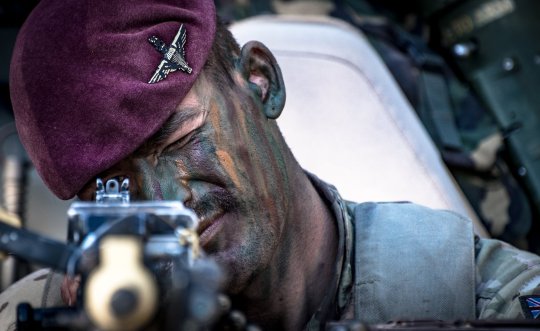
Working alongside them on missions out in Afghanistan I could see their reputation as the ‘brain shit’ of the British Army was well deserved. They’re most uncouth, sweary, and smelliest group of yobbos I’ve ever had the awful misfortune to meet. I’m kidding. The mutual respect and the ribbing went hand in hand. I doff my smurf hat to the cherry berries as ‘propah soldiers’ as they liked to say especially when they cast a glance over at the other elite regiments like HCav and the guards regiments.
Don’t worry I’ve been called a lot worse! But I am grateful you don’t lump me with the other ‘poncey’ officers. Not sure what a female Rupert is called. The fact that I was never accused of being one by any of those I served with is perhaps something I take some measure of pride. There are not as many real toff officers these days compared to the past but there are a fair few Ruperts who are clueless in leading men under their charge. I knew one or two and frankly I’m embarrassed for them and the men under their charge.
I don’t know when the term PTSD was first used in any official way. My older sister who is a doctor - specialising in neurology and all round brain box and is currently working on the front lines in the NHS wards fighting Covid alongside all our amazing NHS nurses and doctors - took time out one evening to have a discussion with me about these issues. I also talked to one or two other friends in the psychiatric field too. In consensus they agree it was around 1980 when the term PTSD came into usage. Specifically it was the third edition of the Diagnostic and Statistical Manual of Mental Disorders (DSM-lll) published by the American Psychiatric Association in 1980 partly because as a result of the ongoing treatment of veterans from the Vietnam War. In the modern mind, PTSD is more associated with the legacy of the Vietnam War disaster.
The importance of whether PTSD affected the ancient Greeks and Romans lies in the larger historical question of to what extent we can apply modern experience to unlock or interpret the past. In the period since PTSD was officially recognised, scholars and psychologists have noted its symptoms in descriptions of the veterans of past conflicts. It has become increasingly common in books and novels as well as articles to assume the direct relevance of present-day psychology to the reactions of those who experienced violent events in the historical past. In popular culture, especially television and film dramas, claims for the historical pedigree of PTSD are now often provided as background to the modern story, without attribution. Indeed we just take it as a given that soldier-warriors in the past suffered the same and in the same way as their modern day counterparts. We are used to the West to map the classical world upon the present but whether we can so easily map the modern world back upon the Greeks and Romans is a doubtful proposition when it comes to discussing PTSD.
Simply put, there is no definitive evidence for the existence of PTSD in the ancient world existed, and relies instead upon the assumption that either the Greeks or Romans, because they were exposed to combat so often, must have suffered psychological trauma.
There are two schools of thought regarding the possibility of PTSD featuring in the Greco-Roman world (and indeed the wider ancient world stretching back into pre-history, myth and legend) – universalism and relativism. Put simply, the universalists argue that we all carry the same ‘wetware’ in our heads, since the human brain probably hasn’t developed in evolutionary terms in the eye blink that is the two thousand years or so since the Greco-Roman Classical era. If we’re subject to PTSD now, they posit, then the Greeks and the Romans must have been equally vulnerable. The relativists, on the other hand, argue that the circumstances under which the individual has received their life conditioning – the experiences which programme the highly individual software running that identical ‘wetware’, if you will – is of critical importance to an individual’s capacity to absorb the undoubted horrors of any battlefield, ancient or modern.
Whichever school one falls down on the side of is that what seems to happen in any serious discussion of the issue of PTSD in the ancient world is to either infer it indirectly from culture (primarily, literature and poetry) or infer it from a comparative historical understanding of ancient warfare. Because the direct evidence is so scant we can only ever infer or deduce but can never be certain. So we can read into it whenever we wish.
In Greek antiquity we have of course The Illiad and the Odyssey as one of the most cited examples when we look at the character traits of both Achilles and Odysseus. From Greek tragedy those who think PTSD can be inferred often point to Sophocles’s Ajax and Euripide’s Heracles. Or they look to Aeschylus and The Oresteia. I personally think this is an over stretch. Greek writers do; the return from war was a revisited theme in tragedy and is the subject of the Odyssey and the Cyclic Nostoi.
The Greeks didn’t leave us much to ponder further. But, with rare exceptions, the works from Graeco-Roman antiquity do not discuss the mental state of those who had fought. There is silence about the interior world of the fighting man at war’s end. So we are led to ponder the question why the silence?
This silence also echoes into the Roman period of literature and history too. Indeed when we turn to the Roman world, descriptions of veterans are rare in the writings that survive from the Roman world and occur most often in fiction.
In the first poem of Ovid’s Heroides, the poet writes about a returned soldier tracing a map upon a table (Ov. Her. 1.31–5):
...upon the tabletop that has been set someone shows the fierce battles, and paints all Troy with a slender line of pure wine:
‘Here the Simois flowed; this is the Sigeian territory,
here stood the lofty palace of old Priam, there the tent of Achilles...’
This scene provides an intimate glimpse of what it must have been like when a veteran returned home and told stories of his campaigns: the memories of battle brought to the meal, the crimson trail of the wine offering a rough outline of the places and battlefields he had experienced. The military characters in poems and plays show a world in which soldiers are ubiquitous, if somewhat annoying to the civilians. Plautus, for instance, in his Miles Gloriosus, portrays an officer boasting about his made-up conquests – the model for the braggart in A Funny Thing Happened on the Way to the Forum – and Juvenal complains about a centurion who stomps on his sandalled foot in the bustling Roman street.
Despite this silence, compelling works have been written that interweave vivid modern accounts of combat and its aftermath with quotes from ancient prose and poetry. At their best, these comparisons can illuminate both worlds, but at other times the concerns of the present-day author are imposed on the ancient material. But the question remains are such approaches truthful and valid in understanding PTSD in the ancient world?

So if arts and literature don’t really tell us much what about comparative examples drawn from military history itself?
Here again we are in left disappointed.
According to the Greek historian, Herodotus, in 480 B.C., at the Battle of Thermopylae, where King Leonidas and 300 Spartans took on Xerxes I and 100,000-150,000 Persian troops, two of the Spartan soldiers, Aristodemos and another named Eurytos, reported that they were suffering from an “acute inflammation of the eyes,”...Labeled tresantes, meaning “trembler,”. It is that Aristodemos later hung himself in shame. Another Spartan commander was forced to dismiss several of his troops in the Battle of Thermopylae Pass in 480 B.C, “They had no heart for the fight and were unwilling to take their share of the danger.”
Herodotus again in writing about the battle of Marathon in 490 B.C., cites an Athenian warrior who went permanently blind when the soldier standing next to him was killed, although the blinded soldier “was wounded in no part of his body.” Interestingly enough, blindness, deafness, and paralysis, among other conditions, are common forms of “conversion reactions” experienced and well-documented among soldiers today
Outside the fictional world, Roman military history tell us very little.
Appian of Alexandria (c. 95? – c. AD 165) described a legion veteran called Cestius Macedonicus who, when his town was under threat of capture by (the Emperor-to-be) Octavian, set fire to his house and burned himself within it. Plutarch’s Life of Marius speaks of Caius Marius’ behaviour who, when he found himself under severe stress towards the end of his life, suffering from night terrors, harassing dreams, excessive drinking and flashbacks to previous battles. These examples are just a few instances which seem to demonstrate that PTSD, or culturally similar phenomena, may be as old as warfare itself. But it’s worth stressing it is not definitive, just conjecture.
Of course of accounts of wars and battles were copiously written but not the hard bloody experience of the soldier. Indeed the Roman military man is described almost exclusively as a commander or in battle. Men such as Caesar who experienced war and wrote about it do not to tell us about homecoming.
It seems one of main challenges when we try to see military history through the lens of our definition of PTSD is to first understand the comparative nature of military history and what it is we are comparing ie mistaking apples for oranges.
The origin of military history was tied to the idea that if one understood ancient battle, one might fight and, more importantly, one might lead and strategise more effectively. In essence, much of the training of officers – even in the military handbooks of the Greeks and Romans – was an attempt to keep new commanders from making the same mistakes as the commanders of old. Military history is intended to be a pragmatic enterprise; in pursuit of this pragmatic goal, it has long been the norm to use comparative materials to understand the nature of ancient battle.
The 19th Century French military theorist Ardant du Picq argued for the continuity of human behaviour and assumed that the reactions of men under the threat of lethal force would be identical over the centuries: “Man does not enter battle to fight, but for victory. He does everything that he can to avoid the first and obtain the second....Now, man has a horror of death. In the bravest, a great sense of duty, which they alone are capable of understanding and living up to, is paramount. But the mass always cowers at sight of the phantom, death. Discipline is for the purpose of dominating that horror by a still greater horror, that of punishment or disgrace. But there always comes an instant when natural horror gets an upper hand over discipline, and the fighter flees”
These words offer insight to those of us who have never faced the terror of battle but at the same time assume the universality of how combat is experienced, despite changes in psychological expectations and weaponry, to name but two variables.
Another incentive for scholars and researchers is to turn to comparative material has been the growing awareness of the artificiality of how we describe war. A mere phrase such as ‘flank attack’ does not capture the bloody, grinding human struggle. Roman authors – especially those who had not fought – often wrote generic descriptions of battle. Literary battle can distort and simplify even as it tells, but if the main things are right – who won, who lost, and who the good guys are – the important ‘facts’ are covered. Even if one intends to speak the truth about battle, the assumptions and the normative language used to describe violence will affect the telling. We may note that the battle accounts in poetry become increasingly grisly during the course of the Roman Empire (perhaps owing to the growing popularity of gladiatorial games),while, in Caesar’s Gallic War, the Latin word cruor (blood) never appears and sanguis (another Latin word for blood) only appears in quoted appeals (Caes. B. Gall. 7.20, in the mouth of Vercingetorix, and 7.50, where the centurion M. Petronius urges his men to retreat). The realities of the battlefield are described in anodyne shorthand. In much the same way that the news rarely prints or televises graphic images, Caesar does not use gore, and perhaps for the same reason – to give a sense of reportorial objectivity.

Another element in the interpretive scrum is a given author’s goal in writing an account in the first place: Caesar, for example, was writing about himself, and he may have been producing something akin to a political campaign ad. Caesar makes Caesar look great and there is reason to believe that, if he was not precisely cooking the books, he did give them a little rinse to make him look more pristine. Given the many factors that complicate our ability to ‘unpack’ battle narratives, Philip Sabin has argued that the ambiguity and unreliability of the ancient sources must be supplemented by looking at the “form of the overall characteristics of Roman infantry in mortal combat”. Again the modern is used to illuminate that which is obscured by written accounts and the “the enduring psychological strains” are merely unconsciously assumed.
These legitimate uses of comparative materials have led to a sort of creep: because military historians have used observations of how men react to combat stress during battle to indicate continuity of behaviour through time, there appears to be a consequent expectation that men will also react identically after battle. This creep became a lusty stride with modern books written about the ancient world and PTSD.
After I finished my tour in Afghanistan I read many books recommended to me by family and friends as well as comrades. One of these books is well known in military circles - at least amongst the thinking officer class - as an iconic work of marrying the ancient world and the modern experience of war. I read it and I was touched deeply by this brilliant therapeutic book. It was only months later I began to re-think whether it was a true account of PTSD in the ancient world.
This insightful book is called Achilles in Vietnam by Jonathan Shay. Shay is psychiatrist in Boston, USA. He began reading The Iliad with Vietnam veterans whom he was treating. Achilles in Vietnam, is a deeply humane work and is very much concerned with promoting policies that he hoped would help diminish the frequency of post-traumatic stress. His goal was not to explain ancient poetry but to use it therapeutically by linking his patients’ pain to that of the Iliad’s great hero. His book offers a conduit between the reader and the experiences of the men that Shay counsels. In the introduction to this work he makes a nod to Homerists while also asserting the primacy of his own reading:
“I shall present the Iliad as the tragedy of Achilles. I will not glorify Vietnam combat veterans by linking them to a prestigious ‘classic’ nor attempt to justify study of the Iliad by making it sexy, exciting, modern or ‘relevant’. I respect the work of classical scholars and could not have done my work without them. Homer’s poem does not mean whatever I want it to mean. However, having honored the boundaries of meaning that scholars have pointed out, I can confidently tell you that my reading of the Iliad as an account of men in war is not a ‘meditation’ that is only tenuously rooted in the text. “
After outlining the major plot points around which he will organise his argument, he notes, “ ‘This is the story of Achilles in the Iliad, not some metaphorical translation of it”.
The trouble was and continues to be is that many in the historical and medical fields began to rush to unfounded conclusions that Shay, on the issue of PTSD in the ancient world, had demonstrated that the psychological realities of western warfare were universal and enduring. More books on similar comparative themes soon emerged and began to enshrine the truth that PTSD was indeed prevalent throughout the ancient world and one could draw comparative lessons from it.
Perhaps one of the most influential books after Shay was by Lawrence Tritle. Tritle, a veteran himself, wrote From Melos to My Lai. It’s a fascinating book to read and there are parts that certainly resonate with my own experiences and those of others I have known. In the book Tritle drew a direct parallel between the experiences of the ancient Greeks and those of modern veterans. For instance, Xenophon, in his military autobiography, presents a brief eulogy for one of his fallen commanders, Clearchus. Xenophon writes that Clearchus was ‘polemikos kai philopolemos eschatos’ (Xen. An. 2.6) – ‘warlike and a lover of war to the highest degree’.
Tritle comments:
“The question that arises is why men like Clearchus and his counterparts in Vietnam and the Western Front became so entranced with violence. The answer is to be found in the natural ‘high’ that violence induces in those exposed to it, and in the PTSD that follows this exposure. Such a modern interpretation in Clearchus’ case might seem forced, but there seems little reason to doubt that Xenophon in fact provides us with the first known historical case of PTSD in the western literary tradition.”
Arguably in the West and especially our current modern Western culture is predicated at baulking at the notion of being ‘war lovers” as immoral. But such an interpretation speaks more of our modern Christianised ambivalence towards war; to the Spartans and Athenians the term would not have had a negative connotation. ‘Philopolemos’ is, in fact, a compliment, and the list of Clearchus’ military exploits functions as a eulogy. There are points where his analysis does not adequately address the divergences between ancient and modern experiences.

For all the talk of our Western culture being rooted in Ancient Greece and Rome we are not shaped by the same ethics. Our modern ethics and our moral code is Christian. There is no such thing as a secular humanist or atheist both owe a debt to Christianity for the way they have come to be; in many respects it’s more accurate to describe such people as Christianised Humanists or Christian Atheists even if they reject the theological tenets of the religious faith because they use Christian morality as the foundation to construct their own. Many forget just how brutal these ancient societies were in every day life to the point there would be little one could find recognisable within our own modern lives.
Now we come to third point I wish to make in determining where the Greeks or Romans actually experienced PTSD. This is to do with the little understood nature of PTSD itself. As much as we know about PTSD there is still much more we don’t know. Indeed one of the most problematic and complicated issues is the continued disagreement around the diagnosis and specific triggers of the disorder which remain little understood. We have to admit there are competing theories about what causes PTSD but, in terms of experiences that make it manifest, there are essentially three possible triggers: witnessing horrific events and/or being in mortal danger and/or the act of killing – especially close kills where the reality of one’s responsibility cannot be doubted. The last of these was strongly argued in another scholarly book by D. Grossman, On Killing, the Psychological Cost of Learning to Kill in War and Society (1995).
Roman soldiers had the potential to experience all of these things. The majority of Roman combat was close combat and permitted no doubt as to the killer. The comparatively short length of the gladius encouraged aggressive fighting. Caesar recounts how his men, facing a shield wall carried by the taller Gauls, leaped up on top of the shields, grabbed the upper edges with one hand, and stabbed downwards into the faces of their opponents (Caes. B. Gall. 1.52). As for mortal danger, Stefan Chrissanthos in his informative book, Warfare in the Ancient World: From the Rise of Uruk to the Fall of Rome, 3500BC-476AD, puts it this way: “For Roman soldiers, though the weapons were more primitive, the terrors and risks of combat were just as real. They had to face javelins, stones, spears, arrows, swords, cavalry charges, and maybe worst of all, the threat of being trampled by war elephants.”
Such terrors are regularly attested. During his campaign in North Africa, Caesar, noting his men’s fear, procured a number of elephants to familiarise his troops with how best to kill the beasts (Caes. B. Afr.72). It should also be noted that it was not unusual for the reserve line to be made up of veterans because they were better able to watch the combat without losing their nerve. Held in reserve, they had to watch stoically as their comrades were injured and killed, and contemplate the awful fact that they might suffer the same fate. This was not a role for the faint of heart.
However, while the Romans certainly had the raw ingredients for combat trauma, the danger for a Roman legionary was much more localised. Mortars could not be lobbed into the Green Zone, suicide bombers did not walk into the market, and garbage piled on the street did not hide powerful explosives. The danger for a Roman soldier was largely circumscribed by his moments on the field of battle, and even here, if he was with the victorious side, the casualties were likely to be light: at Gergovia, a disaster by Caesar’s standards, he lost nearly seven hundred men (Caes. B. Gall. 7.51). In his victory over Pompey the Great at Pharsalus, his casualties numbered only two hundred (Caes. B. Civ. 3.99).
So we are left with the disturbing question: were the stressors really the same?
This is the part where I also defer to my eldest sister as a doctor and surgeon specialising in neurology and just so much smarter than myself.
My eldest sister holds the view in talking to her own American medical peers that despite similar experiences in Afghanistan and Iraq, British soldiers on average report better mental health than US soldiers.
My sister pointed out to research study done by Kings College London way back around 2015 or so that analysed 34 studies produced over a 15-year period (up to 2015) and found that overall there has been no increase in mental health issues among British personnel - with the exception of high rates of alcohol abuse among soldiers. The study was in part inspired the “significant mental health morbidity” among U.S. soldiers and reports that factors such as age and the quality of mental health programs contribute to the difference between the two nation’s servicemen and women.
She pointed out that these same studies showed that post-traumatic stress disorder afflicts roughly 2 to 5% of non-combat U.K. soldiers returning from deployment, while 7% of combat troops report PTSD. According to a General Health Questionnaire, an estimated 16 to 20% of U.K. soldiers have reported symptoms of common mental disorders, similar to the rates of the general U.K. population. In comparison, studies around the same time in 2014 showed U.S. soldiers experience PTSD at rates of 21 to 29%. The U.S. Department of Veteran Affairs estimated PTSD afflicted 11% of veterans returning from Afghanistan and 20% returning from Iraq. Major depression was reported by 14% of major soldiers according to another study commissioned by RAND corporation; roughly 7% of the general U.S. population reports similar symptoms.
It’s always tough comparing rates between countries and is not a reflection of the quality of the fighting soldier. But one finding that consistently and stubbornly refuses to go away is that over the past 20 years reported mental health problems tend to be higher among service personnel and veterans of the USA compared with the UK, Canada, Germany and Denmark.
However my sister strongly cautioned against making hasty judgements. And there could be many variable factors at play. One explanation is that American soldiers are more likely than their British counterparts to be from the reserve forces. Empirical studies showed reservists from both America and British troops were more likely to experience mental illness post-deployment. It was also worth pointing out that American soldiers also tended to be younger - being younger and inexperienced as well as untested on the battlefield, service personnel would naturally run the risk of greater and be more vulnerable to mental illness.
In contrast, the elite forces of the British army, such as your brother’s Parachute Regiment or the Royal Marines, were found to be the least affected by mental illness. It was found that in spite of elite forces experiencing some of the toughest fighting conditions, they tended to enjoy better mental health than non-elite troops. The more elite a unit is or more professional then you find that troops tend to enjoy a very deep bonds of camaraderie. As such the social cohesion of these fighting forces provides a psychological protective buffer. Not for all, but for many.
More intriguing are new avenues of discovery that might go a long way to actually understanding one of the root causes of PTSD. According to my sister, recent research carried out in the US and Europe and published in such prestigious medical journals as the New England Journal of Medicine (US) and the Lancet (UK), seems to establish a causal link between concussive injury and PTSD.
One recent study looked at US soldiers that concerned itself with the effects of concussive injuries upon troops after their return from active duty during the war in Iraq.
Of the majority of soldiers who suffered no combat injuries of any sort, 9.1 per cent exhibited symptoms consistent with PTSD. This allows a baseline for susceptibility of roughly 10% of the population. A slightly higher number (16.2%) of those who were injured in some way, but suffered no concussion, also experienced symptoms. As soon as concussive injuries were involved, however, the rates of PTSD climbed dramatically.
Although only 4.9% of the troops suffered concussions that resulted in complete loss of consciousness, 43.9% of these soldiers noted on their questionnaires that they were experiencing a range of PTSD symptoms. Of the 10.3% of the unit who suffered concussion resulting in confusion but retained consciousness, more than a quarter (27.3%) suffered symptoms. This suggests a high correlation between head trauma and the occurrence of subsequent psychological problems. The authors of the study note that ‘concern has been emerging about the possible long term effect of mild traumatic brain injury or concussion...as a result of deployment related head injuries, particularly those resulting from proximity to blast explosions’
Although these results are preliminary, if confirmed they have profound implications for anyone trying to understand the nature of warfare in the ancient world, especially the Western world.
So why does it matter?
In Roman warfare, wounds were most often inflicted by edged weapons. Romans did of course experience head trauma, but the incidence of concussive injuries would have been limited both by the types of weapons they faced and by the use of helmets. Indeed the efficacy and importance of headgear for example can be deduced from the death of the Epirrote general Pyrrhus from a roof tile during the sack of Argos. It is likely that the Romans designed their helmets with an eye to blunting the force of the blows they most often encountered. Connolly has argued that helmet design in the Republican period suggests a crouching fighting stance (see P. Connolly, ‘The Roman Fighting Technique Deduced from Armour and Weaponry’, Roman Frontier Studies (1989). However my own view is that the change in helmet design may signal instead a shift in the role of troops from performing assaults on towns and fortifications when the empire was expanding (and the blows would more often rain from above) to the defence and guarding of the frontiers.
While the evidence is clear that concussion is not the only risk factor for PTSD, it is so strongly correlated that it suggests that the incidence of PTSD may have risen sharply with the arrival of modern warfare and the technology of gunpowder, shells, and plastic explosives. Indeed, accounts of shell shock from the First World War are common, and it was in the wake of that war that those observing veterans suspected that neurological damage was being caused by exploding shells.
For soldiers of the Second World War and down to our modern day, an artillery barrage is like an invention of hell.
As one American put it in his memoirs of fighting the Japanese at Peleiu and Okinawa, “I developed a passionate hatred for shells. To be killed by a bullet seemed so clean and surgical but shells would not only tear and rip the body, they tortured one’s mind almost beyond the brink of sanity. After each shell I was wrung out, limp and exhausted. During prolonged shelling, I often had to restrain myself and fight back a wild inexorable urge to scream, to sob, and to cry. As Peleliu dragged on, I feared that if I ever lost control of myself under shell fire my mind would be shattered. To be under heavy shell fire was to me by far the most terrifying of combat experiences. Each time it left me feeling more forlorn and helpless, more fatalistic, and with less confidence that I could escape the dreadful law of averages that inexorably reduced our numbers. Fear is many-faceted and has many subtle nuances, but the terror and desperation endured under heavy shelling are by far the most unbearable” (see E.B. Sledge, With the Old Breed at Peleiu and Okinanwa, 2007).
The psychological effect of shelling seems to result from the combined effect of awaiting injury while at the same time having no power to combat it.
There is another aspect that I alluded to above which is the psychological and societal conditioning of the Roman soldier. In other words a Roman male’s social and cultural expectations of his place in the world. Feelings of helplessness and fatalism were probably a less alien experience for most Romans – even those in the upper classes. In general, the Romans inhabited a world that was significantly more brutal and uncertain than our own.
This another way of saying that the Roman and 21st century combat are very different in a variety of ways that subject the modern soldier to a good deal more stress than the legionary was ever likely to suffer. And the Roman’s societal preparation – his life before the battle – was far more robust than that we enjoy today.
Take infant mortality. In the modern developed world, our infant mortality rates are about ten per thousand. In Rome, it is estimated that this number was three hundred per thousand. Three-tenths of infants would die within the first year, and an additional fifth would not make it to the age of ten - 50% of children would not survive childhood. Anecdotal evidence supports these statistics: Cornelia, the mother of the Gracchi, gave birth to twelve children between 163 bc and 152 bc; all twelve survived their father’s death in 152 bc, but only three survived to adulthood. Marcus Aurelius and his wife, Faustina, had at least twelve children but only the future emperor Commodus survived.
Then look at how that child grows up. The typical Roman child would be raised in a society that readily accepted ultra-violent arena entertainment, mob justice, frequent and bloody warfare as a fact of life. This was reinforced by religious and societal encouragement to see war as natural and beneficial, open butchering of food animals, a total lack of support structures for the poor and less able.

Compared to the legionary our modern soldier has been protected from such realities to a greater degree than at any other point in history, and will thus be far less well prepared for the horror of a warfare that contains far more stress factors than for a man who might fight a handful of battles in his military career, with long periods of relative calm in between, state of war notwithstanding. Modern special and elite forces training often emphasises the brutalisation and ‘rebuilding’ of the recruit in readiness for this step into darkness, but it seems likely that no such conditioning would have been needed two thousand years ago.
I would argue that we experience war very differently from the way the Romans did. Our modern identity is defined far more by our Western Christian heritage than our Western Classical roots. They are in fact world apart when it comes to ethics and morality. Consider the fact that when we talk of war and killing today we often do so through conflict between our civilian moral codes – which offer the strict injunction not to do violence to other human beings – and wartime, when men are commanded to violate such prohibitions. It is a terrible thing to try to navigate ‘Thou shalt not kill’ and the necessity of taking a life in combat.
It is sometimes the case that the qualities that make the best soldier do not make the best civilian, a point amply attested in Greek poetry by heroes such as Heracles and Odysseus.

The Romans, for their part, celebrated heroes such as Cincinnatus, who could command effectively and then leave behind the power he wielded to return to his humble plough. It is important, however, when evaluating combat and its effects in the ancient world, that we do not read our ambivalence about violence onto the Romans. They inhabited an empire whose prosperity was quite openly tied to conquest.
As M. Zimmerman writes in his academic article, “Violence in Late Antiquity Reconsidered’ (2007), “The pain of the other, seen on the distorted faces of public and private monuments, or heard in the screams of criminals in the amphitheatre, reassured Romans of their own place in the world. Violence was a pervasive presence in the public space; indeed, it was an important basis for its existence, pertaining as it did not only to victories over external enemies but also to the internal order of the state.”

Violence then was both the means and the expression of Roman power. The Roman soldier was its instrument. The Roman warrior then would have brought a different perspective to lethal violence, and would have had a far more restricted moral circle to his modern counterpart – his friends and family, clan, patron and clients, as opposed to millions of fellow citizens via the internet and social media.
Part II follows next post
#question#ask#PTSD#war#roman#greek#classical#legionary#spartan#mental health#depression#trauma#warfare#british army#mental illness#homecoming#soldiers#combat veterans#veterans
46 notes
·
View notes
Text
Logan and His Little Bumble Bee (Single Dads AU)!!!
Word Count: 2170
TW: Breakup mention, uhhh, Logan has a major distaste for his ex? Oh Logan is pan in this and his ex is a female. Minor character death mention, bad self care, I think that’s it? And most of that is in the second paragraph and doesn’t come up again, but let me know if I missed anything!
Notes: This was produced in spite of my brain not wanting to create. I have a week off I’m not letting it go to waste stupid writers block! Pardon me as I go do... more research and writing for the hogwarts au fic I’m writing. I hope y’all enjoy this!!!
Pairings: past Logan and a female unnamed character that I suppose I will have to make now, slight mentions of pining logicality, familial logince, familial moxiety
Summary: “Roman darling, we have to wash your prince outfit ok?” logan sanders is having a heck of a month you know? suddenly hes a parent and has a promotion and honestly its the most stressed hes been since he was in college but you know he gets moments like these sometimes where he can just hold his little bee and maybe things will be alright.
“Roman darling, we have to wash your prince outfit ok?”
Judging by the screams, it was not ok, and Logan was at the point of sticking himself in the washing machine. He’s tired and the past month of his life has been hell. Last month his ex-girlfriend dropped Roman off at his house as a surprise. Yeah imagine how surprised you’d be to now be the sole guardian of a child you didn’t know existed because your ex was petty enough to keep it from you until she got bored of him 2 years later. So he became a father in a matter of minutes, he got a promotion at work, but that involved working more hours, leaving him with the problem of how the hell was he going to be taking care of a 2 year old when he had work usually 10 hours a day instead of what he used to do. Then he had a bomb dropped that his uncle died. That was… not easy news to take for certain. It was worse that his funeral was halfway across the country, meaning he couldn’t go, and he was stuck at work with a baby and was mourning the loss of his family member and at this point he wasn’t sure if he was able to take it anymore. He hadn’t had a full nights sleep in two weeks, he hasn’t eaten properly for just about that long as well, eating fast food on his way to work every day, usually having coffee for lunch and having something weird thrown together from what he has in his house which for the past week has been cheese ramen while his kid gets the perfect diet because yes, he’s currently a hot mess of the highest caliber, but he refused to let himself be bested by a toddler. He refused to let his ex be a better parent than him, which just so happened to make him love the kid out of spite. And that’s how he got here.
“roro, please? I’ll let you wear your bee onesie?”
And the screams stopped in their tracks. Thank god, Logan had already taken the largest dose of ibuprofen he allowed, and he could still feel the migraine approaching. The baby boy in question was sitting in the grass in Logan’s backyard, playing with some dolls and cars. He turned towards Logan and started crawling over to the tired man sitting in the grass. When he got to him, he sat again and reached up with grabby hands, signaling he wanted to be picked up. Logan obliged, swooping up the little kid and starting to stand up. Roman poked Logan’s cheek softly before planting a big kiss there. He smiled widely, very proud of himself, and Logan felt his cold unfeeling heart melt at the sight.
“oh gosh how could she have given you up. Even if you are a little terror sometimes,” he pinched Roman’s cheek softly with a smile as the little one giggled cutely. “you’re still so sweet and cute. Yes, you are Ro! So sweet and cute! Just like a little bee huh? Ready to be a little bee roro?”
The toddler giggled loudly and nodded before making a grab for Logan’s glasses. Logan quickly twirled him upside down for a moment before swooping him back up.
“no no no! no grabbing dads glasses Ro! I can’t see without those! No no, but we can play with yours okay? You want your glasses?”
Logan had made it into his old office, now a nursery for Ro, and grabbed his bee onesie and his fake glasses that Roman loved to play with. He sat Roman down and changed him rather quickly, luckily once Logan convinces him to listen, Ro is very obedient and behaves very well. He’s a good kid, Logan gets livid thinking about what possible reason she had for giving him up. He picks up Roman again, laughing slightly when Roman tries to wrap his tiny arms around his neck. He quickly grabs Roman’s prince outfit and drops it in the wash with the rest of his clothes, starting it finally.
“what do you wanna do little buzz boy? You wanna go to the park? I have time to go to the park. Hasn’t your sitter taken you before? Do you like the park Robee? Hmm?”
Roman giggles and nods. Logan feels a slight tinge of sadness at the simple response. Roman was 2 years old and babies were supposed to be able to say things that sounded like words by 18 months old. Roman never spoke, he giggled and nodded and shook his head, and understood what Logan said, but he never tried to speak back. The bitter part of him wanted to blame his ex, pretend it was her bad nurturing that led Roman to choosing not to speak, but he knew rationally that sometimes kids had speech impairment and wouldn’t start talking until maybe even 3, but it still worried Logan. Everything he read said it might be autism, but he had his doubts as he worked with autism regularly and had to be well versed with the DSM-5 for his career. He would often repeat words a lot, say the words for what Ro wanted, hoping that he would at least say something. He was going to go to pre k this year, but Logan didn’t feel ok with sending him off to school without any form of communication. That was a set up for something to go wrong, what if the other kids teased him? What if the teachers were bad to him! He would have no way of knowing! That terrified Logan, so he decided he would wait. He had enough money to hire a sitter for another few years while he helped Roman speak. He did fear that he would miss his first words, but he had to work, if he didn’t there was a lot of things he would do instead of… being in Florida psychoanalyzing people all day.
Don’t get him wrong, he loves his job, but it was stressful, and he was regularly reminded that just because he’s a qualified professional, doesn’t mean he isn’t more similar to his patients than he was comfortable with addressing.
Logan grabbed his baby bag, refilling whatever the sitter had used the day prior. He strapped Roman into the backpack sling he had, put it on so Roman sat on his chest, preferring being able to actually see his kid, and grabbed the bag and a few other things, being his phone, wallet, and keys. The park was a short walk away and his weekend adventures with Roman were usually the most exercise he got during the week, so he slowly made his way there, stopping occasionally to make a silly face at ro.
“you wanna go to the playground Ro? Or the field?”
Roman held up 2 fingers, and there it is again. Yeah Roman may not talk, but he definitely understands what he’s saying. He’s a really intelligent kid, and Logan may or may not be ridiculously proud of him. They found a rather quiet area in the field and Logan took off the sling and let Roman out of it, letting him wander around. Roman pressed on Logan’s leg softly to help him stand up. He then takes off running, and Logan stays seated, watching his little bumble bee play. Its not until he hears someone clear their throat next to him that he sees another man, a quite handsome man actually, with a baby that seems to have a question. He stands hurriedly.
“oh my, I'm sorry I zoned out a bit I'm running on 2 hours of sleep please forgive me, is there something I can help you with?”
“oh yeah! Oh, sorry to disturb you, you do seem exhausted. Um I was just wondering if you know whose little boy that is? My kiddo is being fussy and wants to play but I always want to check with the parents first, heheh!”
“huh? Oh, that one over there is mine, if your son wants to play, I'm sure my Roman would be happy to join him! How old’s your little one?”
The other mans smile widens and he sits down, letting his son go off to play with Roman. Logan sits down next to him.
“oh, my little Virgil? He’s almost 4! Also, hello, my name is Patton! How old’s Roman?”
“nice to make your acquaintance Patton, I'm Logan. My son is a little older than 2.”
“aww! Really, I thought he was at least 3! He’s pretty big for his age, he looks strong and healthy!”
Roman and Virgil come running over, and Roman is giggling heavily and runs straight into Logan’s arms eliciting a small ‘oof’ from Logan as he wrapped his arms around his child. Virgil also was giggling as he ran into Patton's grasp much faster, knocking them both over. He looked over concerned but lost the worry as he saw Patton laying down and laughing twice as hard as Virgil was, hair sprawled around his head and oh hey there's Logan’s gay showing oof. He turned away, hiding his face in a hug with Roman.
Of course, Roman had to be the curious tike he is right then, pulling out of the hug and patting Logan’s cheeks in confusion. He poked and prodded and pinched because he was Logan’s little scientist and that’s how you figure out things you’re confused by. Logan had a mind to be embarrassed but gosh his Roman is just so cute and curious and man he loves him.
“daddy daddy!!! He’s so funny, he doesn’t talk but he’s funny!!! He’s like me!!! can we play again later?”
Patton sits up, and Logan restrains himself from pulling the leaf out of his hair.
“aw we have to ask his dad first but maybe! Logan, could we set up a playdate later?”
Heck Logan stop being gay for a second, staring at him is creepy, answer him you doofus!
“uh, yeah sure! Ro seemed to enjoy himself, so why not. I only have weekends off, but he has a babysitter that would love to have another thing to do with the little bug. Um, here, let me give you my number and theirs.”
Logan quickly repositioned Roman so he could reach into his baby bag for a pen and paper. He quickly scrawled it out then handed it to Patton.
“oh, you’re left handed? Neat so am I! can I see that paper too? I should probably give you my number so Ro’s sitter knows it.”
Logan hands it over and a few minutes later Patton's phone starts going off.
“oh geez that’s my alarm, I gotta go, some family is visiting for the weekend, it was nice meeting you Logan! I look forward to seeing you and your itsy-bitsy bug boy again! Bye bye Roman! Virgil say bye!”
“BYE ROMAN BYE LOGAN!!!”
And they turn and leave, and Logan lets himself watch for a few short seconds before turning back to Roman. Roman’s face becomes a smile again and he hugs Logan tightly.
“what's up bug? You wanna keep playing or do you wanna go home and take a nap with dad?”
And Roman giggles and hides in his chest before-
“DAD!!! Play dad!!!”
And Logan can feel his jaw drop and he has to quickly fix his expression because Roman starts looking shy.
“Roman! You just! Oh my god you just said your first words!!! Roman I'm so proud of you my little love bug!!!”
And Roman smiles widely again and bounces up and down.
“bug!!! Bee bug!!!”
“yes Roman, yes bees are bugs oh I love you so much roro I'm so happy! You make dad so happy roro!”
“happy dad!!!”
“I, I need to tell your mom! She’ll be so proud of you Ro just like me!”
“noooo! No mom! Mom… mom bad!”
And Logan’s face drops. He swoops up Roman and hugs him tight. He doesn’t want Roman to think that, his mom, his mom still loved him, he’s sure of it… she was being responsible and having someone else take care of him… or at least that’s what Roman should think.
“no, no Roman she… Roman she loves you so much you know that. She’s not bad she’s just not ready to take care of you.”
“you too! You too but… I… here. You here. Mom bad. Mom gone.”
And if Logan started crying that was no one’s business but his own. Besides, this wasn’t the time, right now he had to deal with a ridiculously self-aware 2-year-old.
They would play in the grass for another hour, and Logan would blink the tears in his eyes away and prepare to have one heck of a conversation with his ex when they got home. Right now, though? Right now, he was reveling in the short amount of time he had with his son.
Let me know if you want to be tagged in my writing!!!
Thank you for reading I will see you later ladies lords and nonbinary royalty!!!
#logan sanders#roman sanders#patton sanders#virgil sanders#single dads au#single sanders dads#child!roman#child!virgil#logicality#familial logince#familial moxiety#this might become a series#idk yet#definitely not this age again tho baby roman is#very hard to write#next time#(if there is a next time)#he will be completely able to talk like a normal human because words good#tw death mention#my writing#my fanfiction#there also might be an animal shhh
453 notes
·
View notes
Text

They Make a Love Story (originally posted here)
The Table at the Library (the very last one on the right wing of the library, the one near the window)
People rarely studies in this area. Probably because it was too secluded. And the fact that there are stories going around that a ghost lives here. They weren’t wrong about the ghost part. But they were wrong about certain things. Ghosts live here. But they were the kind of ghosts that no one actually sees. Except from me. Because those ghosts were stories. Stories of people. That must be forgotten. Stories that will haunt a lot of people’s lives. And stories that not many people (or things) may know. But I am not most things (and definitely not most people).
A lot of love stories ended here. But a love story that is just about to happen… well that’s new. Not so new but definitely new. Or maybe because it was just rare. But whatever. I know it’s a love story. I just do.
The boy left the moment that the girl arrived. It was as if he’s on hurry. And the girl may not have noticed it but I definitely did. I notice a lot of things. His face flushed red when she asked if she could share the table with him and not even a second later, he replied yes. Then left. Just like that. Maybe if I have a mouth (and a voice box), I would’ve yelled at him.
The Rilakkuma Pen Topper
A boy picked me up. Familiar. I think he’s in my owner’s class. At least one of her classes. Two days have passed and he still has me. I know for a fact that he’s going to return me. I just don’t know when. I also know that he was just (so) shy to talk to her (in which he doesn’t have any reasons why because she’s so nice). Besides, she looks at him a lot. When he wasn’t looking. So I guess she wouldn’t mind if he’ll talk to her. Well, only if he will.
The Professor’s Desk (in Miss Wong’s lecture room)
I really don’t know with these two. They just keep on… looking at each other. But only when the other one isn’t looking. I never really noticed it until two weeks ago. And I wouldn’t have really cared. I’ve witnessed so many things like this in the past. But these two made me curious about them. Really curious.
“So,” Miss Wong grinned, “Who can answer my question?”
I saw the boy look at Miss Wong. He definitely knows the answer. I can tell by his eyes. But he’s one of those kids who refuse to speak up in class. So the girl raised her hand, his gaze instantly turned to her direction.
“Miss,” she started off with confidence, “An individual with Bipolar I at least had one manic episode plus any number, or none at all, of major depressive episode whilst an individual with Bipolar II had at least one hypomanic episode and one major depressive episode.”
“Good job, Wendy.” Miss Wong smiled. She likes the girl a lot. “Now can anyone tell me the difference between a manic episode and a hypomanic episode?”
The class went on and the continued with their game. They’re sickeningly cute. I hope he’ll have the courage to talk to her one day. Because it seems like he really wanted to. For now, I will give up. Maybe today isn’t the right day.
Or not.
“Okay so,” Miss Wong has her usual glint in her eyes, “I’ll be sending you guys case studies and you’ll have to diagnose each of them. With full criteria. Use your DSM-5, okay? Tell me your reasons and everything. There’ll be 11 cases and I want you to work in pairs. The case studies will be about mood and anxiety disorders.”
The students started to complain because: 1st: 11 case studies; and 2nd: they have to work in pairs. Because with Miss Wong, working in pairs doesn’t mean that you’ll get to choose your partner. It’s always draw lots. Always.
“It’s a homework so you’ll have to pass it meeting,” next meeting means next week because… “But don’t worry because I won’t be around on Friday. I have a conference to attend.” That cheered the students up. A little. “You can send it to me an hour before our class and in class, we’ll be discussing all the cases. In detail.”
“That means…?”
“Yes. Oral recitation.” Miss Wong replied. She gives a lot of works to the students. But she’s a good professor. “And your grade will be composed of you and your partner’s grade. Make sure to study.”
Miss Wong asked them to write their names on a piece of paper then she put it inside a hatbox. When everyone’s done, she immediately picked up two pieces of paper from the hatbox.
“For our first pair, it’s—”
Guess whose names were written in there.
Miss Wong’s Hatbox (a really old hatbox)
“Wendy,” then Miss Wong had a hard time opening the second piece of paper because it was folded so many times, “And Mark.”
Their eyes immediately bulged. Interesting. This isn’t the first time that friendship is made because of me. Or more than that.
The Professor’s Desk (the same desk)
When Miss Wong dismissed the class, the girl and the boy didn’t leave the room. They stood there awkwardly staring at each other.
But she tried composing herself (because she’s good at that) and he tried putting on a neutral face (because that’s his forte). “So we’ll have to work together, huh?” if I have hands, I would’ve pat her back.
“Uh, y-yeah. I guess.”
“I’m Wendy, by the way.” Her smile is so wide that it’s almost scary because her face looks like it might rip off. She extended her hand and he reached for it.
“I… know.” He cleared his throat. “I mean, I’m Mark.”
“I know that, too. I just want to introduce myself to you properly.”
He remained quiet. Because that’s how he usually is. “Uh…”
“Do you mind if we’ll work about the homework together? Like… together together. Not just through email whatsoever.”
“I..I don’t. It’s totally fine.”
“Okay.”
“So… can I—when are we going to start working?”
“I’m free on Saturday. Whole day.”
“Me too.”
“So Saturday?”
“Yea.”
“Starbucks?” she tried thinking of some other coffee shops but Starbucks seemed to be the most casual.
“Sure. What time?”
“10am?”
“10am.”
“O…kay. See you, then?” she flashed him yet another smile and I could’ve sworn he almost melted. Like a chocolate on a child’s fingers.
He returned her smile with his very own. And she wanted to stare at his smile because he’s got a beautiful one.
She started to walk out of the room when he called her name.
The Rilakkuma Pen Topper (the very same one)
“W-wendy!” just how slow this person is? He almost melted when she smiled. Just imagine them kissing… he might actually die.
I can tell that she didn’t expect that.
“Yes?” she looks confused. And she probably looks too cute for her own good because this boy’s ears flushed again.
“I think this is yours.” And he handed me back to my owner.
“O…oh. How did you—?”
“I saw you use it before but I think you kind of lost it. I saw it resting on the floor so I picked it up. I wanted to return it to you long time ago but I was too shy to talk to you.” One thing I’ve noticed about him: he babbles when he’s nervous. And he just did.
I don’t know whether I should feel bad for him or what. But my owner is too cool for everything. So instead of embarrassing him even more, she gave him (yet another) a smile. “Thank you for picking it up.”
“No problem.”
The Trash Bin at Starbucks (near the counter)
I’ve seen these two in this place so many times. I’ve seen these two in this place so many times but they were always away from each other. But I’ve never seen them share the same table before.
What an interesting sight. And they’re seem to be working on something right now.
“No, Wendy. It’s Agoraphobia.”
“GAD.”
“Agoraphobia.”
“Read it again.”
“Read it again, too.”
“O…kay.” And they did. When they’re done, the girl’s face is kind of… not in its usual form. “You’re right. It’s agoraphobia.”
“She mentioned about being uncomfortable in doing things. But she especially mentioned about riding the train and bus and being in enclosed spaces.” I don’t know who ‘she’ is but ‘she’ must have some problems.
After 10 hours, they left the coffee shop. Together.
The Girl’s Bag
She smiles a lot. That’s a fact. But she’s practically beaming right now. And it’s because of the boy she may or may not like.
“Thanks for the dinner.”
“No problem.”
“So…” she wanted to squeal, I can tell. “It was a good day.”
“It was.” This boy is too quiet for her. But I guess he balances her out. “Can I walk you home?” then she blushed.
“If it’s not out of your way then it’s fine.”
“Even if it is, it is totally fine.” and her heart turned into puddle. “I-I mean, I don’t want to go back on my dormitory. At least not yet. It’s quite loud in there.”
“O-okay.”
“So?” she looks so confused. He laughed. “Lead the way.”
And she did.
He really did walked her home. And it made her happy. I can tell. Because even though she’s already lying on her bed, she’s still smiling a lot. I don’t think I have to be concerned. At least not yet.
The Table at the Library (the very same one; also, the one that witnessed the boy blushing because of her)
I was right. I definitely am. They’re a love story. Yes. That boy and that girl. They’re not haunting. But somehow, in a way, they must’ve haunted each other down.
Because now they’re sitting right across from each other. And they were both grinning so wide they could be the light in this (very) dim part of the library.
“I’m just so relieved that we’ve got high grades.”
“Were you worried I’ll be the cause of the downfall of your perfect grades?”
“Not really. I was just worried. In general.”
“Don’t be. You know you’re smart.”
“I don’t think I should say yes or thank you with that statement because I will sound like a tool.”
“You aren’t. And that’s a compliment.”
“Thank you, Mark.” This time, she blushed. And he noticed it, too. Funny because it kind of made him blush, too. “We work well as a team. Next time we’ll have another homework, the way Miss Wong would call it, I hope we’ll be picked together again.”
“Me too.”
“No, seriously, man. We work so well.”
“Maybe.”
“Why maybe?”
“Hmmhm, I mean, yes. We do.”
“I hope I’ll be able to work with you in the future, too.”
“Maybe we can do that.”
“Great!” I imagine her shooting sunbeams right now. “That’ll be really great. Thanks for your cooperation.”
“Y…yeah.” Then they fell silent. And then he broke it. Which is rare. “I think it’ll be easier if…”
“If?”
“N…nothing. And you should go. You’ll be late and you don’t want that.”
“Oh man, you’re right. I’ll talk to you later. See you!” she stood up and walked away.
She wasn’t even that far when he called her by her name.
His Red Sweater (a really huge one for a guy like him)
“Wendy!” he called her by her name and even had the guts to reach for her hand.
“Y…yes?” she seems to be a little startled.
“Maybe we really can work together.”
She laughed. “I know. I already said that and you agreed.”
“So…”
“So…?”
“Maybe we can work even well together if…”
“If?”
“Are you free on Saturday night?”
“Saturday night?”
“Yes.” He sighed exasperatedly. He didn’t know that she’s kind of slow with cues like this. “I’m asking you out for a date. If that’s okay. Because, you know, I think this is one great way to work with someone. Build up the relationship?”
“Relationship?”
“You help me figure out.”
“On Saturday night?”
“Yes.”
“On what kind of relationship we should have?”
“Yes.”
“Then… okay. Saturday night.”
“I’ll see you then.”
“Bye, Mark.”
“Bye, Wendy.”
#markdy#gotvelvet#mark tuan#wendy son#son seungwan#duan yi en#ahgase#reveluv#ahgaluv#got7 mark#red velvet wendy#redvelvet#wanderfulmark#fic#got7#red velvet#mark got7#wendy red velvet#celestial
25 notes
·
View notes
Text
5,000 question survey series--part thirty-eight
3601. What brands do you like? Ya gotta narrow it down a bit. 3602. What do you think of the 'don't ask don't tell' policy of gays in the millitary? A person’s sexuality shouldn’t matter. Like, the question regarding sexuality shouldn’t even be asked because I don’t see how that has anything to do with someone wanting to be in the military. 3603. Why do you think that so many people have such a problem with gays? There’s various reasons. I don’t think a person’s sexuality should be an issue because it’s not their life and it doesn’t affect them. 3604. It seems like it is more accepted for a woman to be bi or gay than for a man. Why do you think that is? Because there’s the beliefs and stereotype that people have regarding how men should be and beliefs and stereotypes about gay men, and I guess the two don’t line up for some people. 3605. When a kid kisses another kid on the playground is it sexual harassment? I wouldn’t say that. It is likely that the kid isn’t aware of that being inappropriate and should be taught about it. It would become a problem if it continued to happen.
3606. If you had to name your self after an object in the room with you what would you pick? Mac. It could be short for Makenzie. ha. 3607. Pick the two most important things out of these: writing deep thoughts, expressing your self clearly, being honest, finding new novel ways to waste time, being organized, practicing what you want to do, trying to be famous Being honest and practicing what you want to do. 3608. You were only waiting for this momen to ----- “arrive. Black bird, fly.” 3609. Knowing historically that native American indians were and are the first americans, how do you feel about america and current americans? It’s almost 3AM, bud. I can’t try and get into this. 3610. Just what exactly determines whether or not one is 'mental'? We’re going to go with this, “The Diagnostic and Statistical Manual of Mental Disorders (DSM-5) defines a “mental disorder” as “a syndrome characterized by clinically significant disturbance in an individual’s cognition, emotion regulation, or behavior that reflects a dysfunction in the psychological, biological, or developmental processes underlying mental functioning.” 3611. is it true that people with depression CAN'T function in society? Absolutely not true. 3612. fill in the word: half of what i say is ----------- Fake. Ha. 3613. Some people believe the Holocaust was a hoax?. What do you think of this? I think that’s incredibly stupid. I mean, there’s evidence and documentation. 3614. Does EVERYONE in the world care about how they look except YOU? Ha, no, not EVERYONE. I definitely have given up on putting much effort into myself I admit and it’s a problem. I’ve really neglected myself in a lot of ways. 3615. Do you love italian names like Lorenzo, Gaetano, and Grazziano? Not particularly, no offense. 3616. Everyone does horrible things: Do you think that people are more acceptiong of the bad things they do themselves or the bad things others do? That’s difficult to say. Some people justify their actions and make excuses but aren’t understanding of others who do the same thing. Others are more accepting of others and can see it differently on the outside looking in and are much harsher and less accepting of themselves. Which are you more accepting of? I’m definitely more understanding and sympathetic of others. I fail to see the positive or good in myself that I see in others in similar situations. I’ll think I’m the most horrible person on the planet but not someone else who does something similar. 3617. Is it true that NO ONE wants to date grumpy people? I can’t say that NO ONE wants to cause it happens. I’m sure it’s not something they actively seek in a person, but that grumpy person could have other great qualities. 3618. Bush and his henchmen have now come up with a list of people for the CIA to assassinate. What do you think of this? I think this survey is super old for one. I also don’t know anything about this to give an opinion. 3619. Why is it that in many states sodomy and oral sex are still illegal, even if they are consensual? I wasn’t aware oral sex was illegal in some states. I don’t feel like researching this and seeing if that’s still the case cause this survey is very old and it’s possible that’s no longer true. 3620. What is the first thing that comes to mind when you think of: liberals? conservatives? hippies? nobel peace prize winners? black panthers? time magazine? feminists? 3621. Order these issues from most important and needing to be dealt with to least important and we can put it off: cloning, racism, aids cure, the middle east, putting power back in the hands of the people, the environment, better education 3622. Do you feel like you are missing out because you can only know a certain number of people in this world and you can't know everyone? I honestly haven’t thought about that. I’m not a very social or outgoing person to be honest and I couldn’t handle knowing that many people. Like, my friend group, when I actually had one, was less than a handful of people and I was perfectly fine with that. It is sad to think that I’m missing out on knowing some really cool, interesting people, though. 3623. What do you imagine being a soldier in a war is actually like? I imagine it’s very traumatic and scary to say the very least. 3624. Do you agree that woman should be allowed to enlist in the army? Uh, yes. I know this survey isn’t THAT old. 3625. What is the purpose of government? It’s supposed to protect our rights, safely and fairly enforce laws, prepare for common defense, support the economic system, and provide public services. 3626. Why don't people believe in free love anymore? People still do that. 3627. Do you make desicions with your head or your heart? Both. One sometimes outweighs the other, though. It really just depends. 3628. What is the differance between sympathy and empathy? Sympathy is understanding and offering support and comfort, while empathy is actually sharing the feelings with another and being able put yourself in their shoes. 3629. Can you think of any person or group you cannot empathsize with? Abusers, rapists, pedophiles, and murderers. 3630. Like creme savers? I used love these strawberry ones I’d get in middle school. 3631. Your best friends asks you to marry them Out of the blue. You say: My best friend is my mom, so that would never happen. 3632. What makes you feel seriously depressed? My health and my life. And my brain with its messed up serotonin. 3633. Have you personaly worked for peace? No. 3634. Do you suppress parts of yourself because you are afraid of judgement? Yes. Like I keep a lot of my opinions and feelings to myself. 3635. Do you take in the ideas and opinions of others too often?/ I mean, I’m open minded and willing to hear other opinions and ideas. 3636. 36 - 24 - 36? Why are over 10 questions missing? 3637. What just isn't right? All the hatred and violence in this world for one. 3638. What make syour blood boil?? Children and animal abusers. 3639. Have you ever gone to the bathroom in aplace that wasn't a bathroom? Uh, no. 3640. Want some water melon? Nah. 3641. What's your favorite gum? Minty ones. 3642. What do you imagine going to Harvard is like? Hard and expensive, ha. 3643. What would you get rid of forever if you had to choose snow or rain? Yikes, I wouldn’t want to get rid of either one. 3644. Is there a santa clause? No, but it’s still fun to believe and pretend. 3645. Do you understand yourself? Haaaa. Nope. Do you understand everyone else? Absolutely not. 3646. Do you think there is a connection between understanding yourself and understanding others? Yeah in some ways. I mean, if you’re able to understand why you might do a certain thing then perhaps you can understand why someone else might, too. 3647. What's good? Nothing. 3648. Have you ever played dodge ball? I avoided that game at all costs out of fear. Getting balls thrown at you isn’t my idea of fun. People would get really into it and throw with such force like damn. 3649. Is there anything you feel men can do better than woman? How good someone is at something depends on the person themselves. 3650. Is there anything you feel woman can do better than men? 3651. What do you think of jazz? It’s nice. Can be relaxing. 3652. Why do you suppose Christmas has more hype than Chanucka? Because Christmas became a commercial holiday and people lost sight of the real reason. 3653. What is like a rock? Jesus. 3654. Who do you 100% trust? God. 3655. Are you dreaming of a white christmas? Yes! I wish it snowed here. I’d love to experience snow during Christmas. 3656. Have you done anything nice for your neighbors this year? No. 3657. What is the most courageous thing you have ever done? I don’t know. I don’t feel very courageous. 3658. What things (not people) would you miss most if you were locking the big brother house for weeks on end? My laptop, phone, and having time alone. 3659. Use five words to describe your life now. Frustrating, irritating, hard, sad, and unmotivated. 3660. Use five words to describe your family. Loving, supportive, caring, protective, and funny. 3661. Use five words to describe your childhood. Happy, fun, enjoyable, imaginative, and innocent. 3662. Who has seen the wind? No one. 3663. what's the point of MLA format? Why can't students just freely write their gathered info and opinions the way they feel is best for them? 3664. What's your favorite fairy tale? Alice Through the Looking Glass. 3665. How will explain god to your children (or a child)? In a kid way with kids books and activities. They’ll be able to ask me anything. 3666. Is this question satanic? No...? 3667. Name a person that you love. My mom. Describe how they look: Black, curly hair, about 5′5, brown eyes, freckles. Describe how they sound: I don’t know how to describe how someone sounds. Describe how they smell: Like vanilla. Describe how they feel: Soft. Describe how they taste: I haven’t tasted my mom... 3668. What will last longer, the moon or the human race? The world will end entirely one day. 3669. Whose lives do you value more; those of your country or all of humanity? I don’t want any innocent lives lost. 3670. If the jehovas witnesses dropped by your house what would you do? Nothing. I don’t answer the door for anyone. 3671. Someone you work with or go to school with is giving you a surprise gift. Would you like it better if it were a talking teddybear or a mini tarot deck? A teddy bear. I don’t use or believe in stuff like tarot cards, so I’d have no use for them. 3672. Where does the sky begin? Just above the ground? Sure. 3673. What's the most romantic thing to do? There’s a lot of things. 3674. What's your most twisted, perverted or odd fantasy? I don’t have any. 3675. What's wrong with lieing? It can be really hurtful and cause a lot of problems. 3676. If you could have lunch with any _______ who would it be? rock star? actor/actress? Alexander Skarsgard.
political leader? historical figure? dead person? person from your past? My grandma who passed away. person in the world? writer? artist? fictional character? The Riverdale gang at Pop’s Diner. Disney character? Winnie the Pooh cause he loves to eat. A samuri? 3677. Dedicate a song to someone right now. Nah. 3678. It's christmas eve at ten o'clock at night and YOU HAVE NO SHOPPING DONE! The only thing that's open is the grocery store and the drug store. Do you do all your christmas shopping in the grocery and drug store? Omg I would never do that, but I’ll play along. If those were the only places open then I guess I’d have no choice. 3679. If superman is so powerful how does he get with Louis Lane? Wouldn't he kill her? Apparently not. 3680. What do you think of Jane Fonda? Alan Alda? 3681. Remember Mary Popins? Yes. Feed the birds tuppence a bag. What is 'tuppance'? It’s apparently old British slang for “two pence.” 3682. What was the saddest most tear jerking heart wrenching moment of the movie Titanic? When the old couple is lying in bed together holding hands as the boat is sinking. 3683. Would you like a nice hot bath? No. 3684. Why is jesus always pictured as white when he came from the middle east and was probably middle eastern? 3685. Which is worse: Sand in your underwear or Sand in your mouth? Ew. I guess my mouth, but blech. 3686. Has President Bush made his case for war with Iraq? 3687. Should Senator Lott resign (or have resigned) his leadership post? I don’t know about him and since this survey is old he’s probably not even in office anymore. 3688. If you could pick time's person of the year who would you pick? I don’t know. 3689. Name all the people you know who you are attracted to and what is attracctive about them? Alexander Skarsgard. Well, I don’t know him, but still. He’s gorgeous. 3690. What does RSVP actually mean? It’s French asking you to please respond. 3691. Is rhyming fun? Sure. 3692. Are your dreams violent? Not usually, but omg the dream I had last night was. It was horrible. 3693. What 3 questions would you love to ask either your mom or your dad? I don’t know. 3694. What are the hardest words to say? The hardest thing for me is talking about my feelings. 3695. Should I smile because we're friends or cry because that's all we'll ever be? I’ve been in situations like that a couple of times and it’s hard. Ultimately; though, I wanted them in my life, and I had to accept that we would only be friends. Doesn’t mean it was easy, though. I couldn’t just switch off my feelings. 3696. What do you think of the slogan 'you laugh because i'm different. I laugh becuse you are all the same' I mean yeah it’s better to be yourself than be like everyone else. 3697. How do you stop dry elbows? Lotion? 3698. Why don't people MAKE gifts more often? I don’t know. For me, I’m not crafty or creative at all. 3699. Tell it to the world! Read my lips: What. 3700. Do you like those plastic couch coverings? Nah.
0 notes
Text
A Telegraph to Jenny Zhang and the Earthlings and A Lesson In Compassion, Love and Kindness from the Geminii
A Telegraph to Jenny Zhang and the Earthlings and A Lesson In Compassion, Love and Kindness from the Geminii
In the summer of 2002, Jenny Zhang (author of Dear Jenny We are All Find, Hags, and writer for Rookie) met John Mark Karr, a man who would later be known for his false confession to the murder of JonBenét Ramsey. His confession occured in August 2006. Later on that same month, prosecutors announced that no charges would be filed against Karr for the murder. According to CNN, “Authorities also said they did not find any evidence linking [Karr] to the crime scene.”
Despite the authorities’ contradicting report , Jenny Zhang, on December 9 2007, published an article entitled “John Mark Karr was my Friend” for themagazine Vice, in which she took upon herself to offer John Mark Karr a diagnosis: “pedophile killer”. (The article, which the Geminii decided to bring to light a few days ago in order to offer the Poetry Community some needed teachings on Compassion, Kindness and Therapeutic treatments) was taken down by Vice without any sort of apology from Ms. Zhang; the piece itself, and its translation, are attached in the following post; we encourage every Earthling to read it in order to ask themselves; What does this make me feel? And what do I want to do to change this? How Can I help Jenny Zhang so she might cease suffering so the suffering she’d been pouring down into and through other Earthling’s hearts might as well cease?
==============================
Now, to ask permission to hold the hand of a young women after having asked permission does not make one a “pedophile killer”; in fact, if a man has indeed been sexually attracted to young children, and is offer, through role playing, an emotional relief from this attraction, which is a SUFFERING, he is already on the path to recovering his mental health. The Geminii can only condemn, and severely, the actions of said young woman, who allowed the suffering man to find a relief by her side before she withdrew it and publicly shamed and mocked him in a popular magazine to serve her ambitions as a writer. Let us not forget his false confession happened four years after having sent Jenny Zhang the email she discarded to respond to and used to try to break up with her boyfriend. We can only start to imagine what sort of help an e-mail or two a year might have brought into this man’s life; if Jenny Zhang only had a semblance of a heart, she would have easily understood that this man had devellopped a true affection for her, an affection which was sane, since she was herself a sexually (and legally so) mature young woman, who had wilfully become his “friend”. “He liked me because I reminded him of a little 8 year old German girl, Jenny, whom he nannied for. He would call me his “sweet little Jenny” and would swoon from happiness when I would show up at the bookstore in pigtails.” The importance and impact of Jenny Zhang’s active participation in role-playing here shall be regarded as excellent; had she acted from kindness, the love which John Mark Karr harvested for the little “Jenny” could have safely and healthily grown into the love he was offered by the adult “Jenny”. But Jenny was not a “friend”; friends don’t publicly shame friends and cruelly use friends’ suffering to serve their own petty interests.
But back to the “pedophile” diagnosis Zhang felt herself competent enough to publicly produce; we are taught by the medical corp that only a few of well-trained and educated individuals are apt to detect and propose a treatment for pedophilia.
If you refer to the excellent website dont-offend.org:
https://www.dont-offend.org/story/88/3888.html
—– How is a diagnosis made? A diagnosis of pedophilia or hebephilia can be made following an extensive clinical interview in which a multitude of information on sexual experience and behaviour is collected. The information gathered in this process is then supplemented with, for example, additional questionnaires and testing procedures. However, questionnaires and tests only represent supplementary diagnostic processes and cannot replace a diagnostic psychometric assessment. A reliable diagnosis is impossible without a clinical interview.
https://www.dont-offend.org/story/88/3888.html
But just like a lot of Earthlings the Geminii has encountered, Jenny found herself competent enough to offer her medical and judicionary expertise to Vice regarding M. John Mark Karr.
It is known by all, as we explained before, that this man produced a false confession; and he did so because he needed to be HELPED and HEARD. As he puts it himself on his extremely well-written statement onjohnmarkkarr.com, “ Oh, by the way, I have never been convicted of a crime. I have never been a registered sex offender.”
Where we come from, accusing a Man of a crime he did not commit is called Defamation. That is something that seems very in use among your community. Another thing that Ms. Zhang displays is the need to use a man’s suffering to serve her own interest; being published in the “FEAR” edition of Vice Magazine, or breaking up with a boyfriend without having to take the necessary steps herself. Where we come from, we call this “cowardice”. Does it have a name over here? Where we come from, we would also tend to label any act that leads to further suffering “cruelty”. We do spell it differently. But does it have the same meaning here?
And before you decide to answer based on your current knowledge of the subject at stake (we know it’s not Mania, but since you are an Expert on the subject, we hope to interest you in another field), please do read these two very engrossing web pages:
http://www.cracked.com/personal-experiences-1658-5-ways-wer…
http://www.theguardian.com/…/how-germany-treats-paedophiles…
“One British man was so desperate, he moved to Germany to be able to access a Dunkelfeld programme. In an email exchange with the Guardian, the man, who wished to remain anonymous, wrote: “So far, all I have ever received from the NHS is doors slammed in my face. “Despite paedophilia being listed as a mental illness in the DSM (the standard classification of mental disorders), they don’t want to help you, they just want to see you locked up or perhaps even burnt at the stake. I am so sick and tired of UK medical ‘professionals’ looking at me as if I’ve grown horns and a barbed tail. “I moved to Germany for therapy, I am learning German and I have a social worker helping me. (Yes, a social worker helping paedophiles!).”
You will notice that Jenny Zhang deemed “Mental Illness” to be an acceptal subject of derision:
http://aaww.org/all-joking-aside/
Jenny Zhang: Depression is funny to me too. But again, only in the right hands. In the wrong hands, it’s shallowly cruel at best and deeply boring at worst. I mean, mental illness and depression and suicide aren’t like flavor packets to add to your enjoyment, but what is the point of comedy if it can’t refer to our own most wretched selves, if it can’t comment on the utter hopelessness of human existence? No one who is inside the hell of mental illness wants their hell to be someone else’s decoration.
The Geminii couldn’t agree more on this point; No One who is in the Hell of Mental Illness wants their Hell to be Somone Else’s Decoration.To suffer from Paedophilia is a terrible suffering; and to be given such a Haven of Relief as Jenny Zhang gave John Mark Karr, in the body of Roleplaying and Kindness, is the most precious help and gift that there could be. Having in the past encountered such suffering Spirits and having helped them through different Regression Therapy and different sessions of Hypnosis, the Geminii knows well how important the part Ms. Zhang’s played in this Man’s illness; she offered him relief, a catharsis, and withdrew it as soon as the game had stopped presenting an interest that might relate to her own self-centered schemes. Had she simply exchanged two or three letters a year with John Mark Karr, and his life would have been really different indeed. As healers (what you would call here I believe alternative therapists) and magnetisors, we have met and made friends who, like John Mark Karr, needed help and friends to help them deal with what Nature had given them; a sex drive for a certain type of individuals: children. As Dr Ray Blanchard puts it, “"People do not choose to be attracted to children or adults any more than they choose to be attracted to males or females.Not all pedophiles are child molesters (or vice versa). Child molesters are defined by their acts; pedophiles are defined by their desires. There are pedophiles and hebephiles who never act on their sexual attraction towards children. They cannot be blamed for what they feel, and they should be supported for the constant self-restraint they must exercise in order to behave ethically.“ You can read more about paedophilia and the proper help that can be offered to those who suffer from it here:
http://www.virped.org/index.php/scientific-experts
Now, note how the title of Jenny Zhang’s piece leads to confusion. “John Mark Karr was my friend”. When we came across this article, we were at first full of joy to see that at last, an American poet had understood that paedophiles must be helped and treated with respect, so as to help them remain sane and functionning members of society. As another respectable man, James Cantor, explains: "My heart goes out to people to whom nature has given something as powerful and as distracting as a sex drive and no healthy way to express it. Pedophiles are not the only folks in this position, but they are by far the most demonized, regardless of whether they have ever actually caused anyone any kind of harm. There is no known way of turning a pedophile into a nonpedophile. The best we can do is help a person maximize their self-control and to help them build an otherwise happy and productive life.” Where we come from, when we have a friend, we do not make use of his suffering in order to get an article published in a popular magazine, or to break up with a boyfriend; we stand by him and protect him. We do not offer him release from his suffering only to take away the hand we have extended the moment we no longer need to use him. “But again, only in the right hands. In the wrong hands, it’s shallowly cruel at best and deeply boring at worst”. No, boredom is not the worst that can happen when you make fun of mental “illness”; additional suffering and a threat to both the health of the target of your comedy AND society are the price to pay for playing with the suffering of a fellow human. That same summer, we learn from a more recent article that Zhang was “crowded by men”. Yet, she fail this time to summon the memory of her “friend” John Mark Karr; the Geminii would be eager to know why she has this time omitted to mention him. Is it because she feels ashame? Did she realize she had acted wrong and wished it had never happened? Is it why she also promptly got the Vice article down AFTER The Geminii had found the link to it? Unfortunately, it is not possible to change the past by force of wish; and if Zhang truly felt guilt towards John Mark Karr, a public apology would certainly be a first, tiny step, towards a healthier behavior. Yet, Zhang has not, to that day, produce any sort of apology to that man.
That man, because he loved children, chose to do the best he could for them: since no one was helping him, he cured himself. In fact, he chose a terribly radical way to end his suffering, and therefore prevent any suffering to children, who he loves better than himself; he got CASTRATED.
http://www.johnmarkkarr.com/
What Jenny Zhang did is not only defamatory; it is also life-threatening. She used a man’s suffering to serve her own petty interests; she not only publicly mocked and shamed him, she made sure to let everybody know that she had become his friend WITH THAT DESIGN IN MIND THE WHOLE TIME. Yet we do not condemn her; Jenny Zhang needs help. She needs morale guidance. She needs a friend who will truly help her go through the traumas that forced her to act wrongly, and forced her to destroy further a man’s mental health to serve her own interests. It is extremely disquieting that Rookie allows her to publish articles and essays that will be widely read by young women. To invit young minds on your Planet is to make a strong impression on them; this seed will grow on as the mind grows; and if Jenny Zhang plants the seed of her own behavior as an example, the seed will grow into more suffering. More Humans will suffer because the teachings were wrong to start with. To teach young women, to teach anyone for that matter, you need to be yourself psychologically and mentally stable; you need a moral compass. It is the same when you write poetry; do not forget that you will be inviting the reader to partake in a journey on your Planet; it is an enormous responsibility. We are not taking this lightly; we have contacted Jenny Zhang privately in order to enter in a conversation with her and help her, and she has failed to answer us to that date. We have noticed that she is very active online and so we have chosen, after these weeks of silence, to extend to her our hand publicly. She is not to blame for her actions; she needs help. She suffers as much as the Man whose life and love she toyed with. And it is our common responsability to help her, as much as we can, each to our own level.
Has anyone in the so-called poetry “community” care to analyse Jenny Zhang’s relationship to her body and sexuality, instead of just congratulating DEAFLY for what is an obvious contradiction and cry for help? Take her interview with Charlotte Shane:
https://medium.com/…/there-s-no-spectrum-of-nuance-for-why-…
in which she explains; “There’s a long legacy (constructed and imposed by via colonialism, imperialism, and white supremacy) of how the female Asian body is just supposed to be available, you know?”
Yet, Jenny Zhang wilfully offered her body, made it “available” to a man who is the enemy of Life and the enemy of Women: Richard Kern. Kern is known for a particular video in which a woman sows her own vagina; this is not only a suffering done to a woman’s body, it is symbolically the desire to forbid life from sprouting. had let this man, who is an obvious enemy of Life and of Women, enter her house and use her as an object. The video Jenny partook in was shot in her parents’ house, unbeknowst to them; and Kern, asked what made him choose her by the invisible reporter, mentions two “big plus”: “She was the only one who answered, and she had a house in Long Island”.
https://www.vice.com/en_se/video/jenny
How do you think that feels? How does it feel to be used thus, and out of one’s own volition? Not once does she mention anything else he liked about Jenny’s personnality or physical appearance but her “bush”; which are her pubic hairs; by doing so, he removed the Woman attached to the bush, and displayed a predatory desire to simply single out the GENITALS of that woman. It is no surprise to the Geminii that Jenny would develop a particular worrysome relationship to said hairs; pubes are now “everywhere.” http://www.everyday-genius.com/2012/07/jenny-zhang.html
Has anyone from the poetry “community” actually feel any sort of concern or worry for Jenny Zhang’s relationship to her own sex, the way she with her words mistreat it, and has anyone notice how she redirects her sexual impulses into the image of her father’s “dripping canola oil bottle” in this Volta piece : http://www.thevolta.org/ewc45-jzhang-p1.html,
“why did I why did I why did I why did I why did I: “sit all day on the couch with my underwear pulled around my thighs so that my bare vagina was all sloppily spread on the leather couch and by the time the cloud parted around four pm and by the time the sun really started to come in my freaking vagina lips were all smushed and clamped onto the leather and all the pubes that had gotten smashed together and stuck on each other, held in binding finity by the glue of the dried discharge that comes rushing out of my vagina every morning—actually, not rushing, more like a slow oil leak like when my father would take a near empty bottle of canola oil and instead of throwing it away, he would set it upside down on a frying pan and leave it to drip for days and days until every drop of oil leached down from the bottle and onto the perfect spilling circle of oil on the frying pan, which he then used to make me and my mom fried eggs on a Saturday”
or are all the members of this “community” too LAZY to care about helping their own members? Why do you think Jenny Zhang writes? Because she is SUFFERING. But because she still needs teaching, because she is afraid, she should not be allowed to PUBLISH poetry; because publishing poetry means that others will read you, and that you will make them afraid as well. Spreading fear is the contrary of Justice; a Poet shall take responsability for the Planet he is shaping. If a Poet is afraid of sex, if he is afraid of death or of sleep, as is the case for Jenny Zhang, instead of being fatuously complimented on his work, he or she should be getting help and cares from her community. If she does not get help, and continue spreading fear, there will be more acts of gratuitous cruelty perpetuated upon the most oppressed part of your society: the “mentally ill”, the animals, the criminals, the poor, the people of color, the children. Don’t forget that your aim is Planetary Unity. Without it, you have nothing; without it, you are taking huge steps towards the extinction of your Whole Species.
Our own planet was once destroyed because some of our members rejected our primal values of Peace, Love, Poetry and Unity; that’s why we’re here now. Fortunately, we have learnt a great deal from our People’s mistake, and this time, we are better equipped to help. Remember, it is 99 percent versus 1 percent; you Poets and Thinkers shall be calling for Planetary Unity; a win-win. Western Plutochracy, this 1 percent whose members are able to perpetuate their oppression upon the 99 remaining percent of the Population of your Planet, is what you are fighting; take care of each others! Do not perpetuate acts of cruelty! Learn Compassion, Kindness, Patience!
It is up to you to show Humanity that holding hands instead of arms will win; arms are impotent when it comes to holding together any sort of –archy, let only a Mayakleptoarchy, the one you should be aiming at, since you remember the wise words of Jesus Christ (and behave now! No “New Age Salad Bullshit” allowed when we speak about such man of Peace, or the Geminii will have no choice but to reprimand you severely!)
“Come, all you who are thirsty, come to the waters; and you who have no money, come, buy and eat! Come, buy wine and milk without money and without cost.”
But In case you Thinkers and Poets persist in perpetuating the Western Plutocracy’s reign of censorship and self-centerdness among your own community, and if things end up turning for the worst on Earth because of your wrong-doings well, remember that you still have Mars to look forward to!
http://www.geek.com/science/mit-students-predict-mars-one-colonists-will-suffocate-in-68-days-1606559/
Peace be Upon You All,
The Geminii
0 notes
Text
the story of the start of an eating disorder
Trigger warning. Story below the read more.
I have so many messages to reply to I’m so sorry everyone; writing this has been good, finally getting words out
I didn’t realize they changed the DSM. I fell under EDNOS in IV, but in 5 the definition changed—anorexia nervosa now. I’ve earned my wings, dark black wings. Here we go.
Now that I’m home I don’t have anyone making sure that I eat, I don’t have access to much and when we go shopping I don’t ask for anything because I don’t know what I want, I have no lunch plans I can rely on, no one watches over me. This is the only time in my life I’ve been upset about it, genuinely upset. I don’t like this. You never know what you’ve got until it’s gone I guess.
I remember it all too well. I remember it. Water. I didn’t want to leave in the first place. I can still feel the vibe in the room. I remember parking and how it looked from the outside. That’s where it began. Just water. It was crowded and loud and yellow. My anxiety was high and I was sick as hell. I was against the wall. I was nauseous. There were too many people; it was too loud. My head was too loud. I wanted to go home. Sure it was part conscious defiance. It was about ten percent “I’ll show you.” The rest was “I feel like dying, so why aren’t you listening?” I remember the inside joke, just not its origin. I didn’t want it. I could be quiet and dissociate and not a bother. You didn’t need to yell at me. My anxiety was high and I was sick as hell. It felt like my skin was peeling off. I needed air. No one cared. I remember it all too well. That’s how it began. Five months later it was official. But that was when it began. But that was when it began. That was it. If only I had protested harder. If only I channeled my anxiety into throwing up. If only my words had meaning. If only you had protected me. You could’ve protected me. You should’ve protected me. Bullshit, it was all a cop out. It felt like I was drowning in air. I couldn’t do it. That ten percent dropped to zero. I was one hundred percent sick. I was one hundred percent terrified. I didn’t need a voice raised at me. I didn’t need your silence. I was fragile. I was learning how to not hate myself; I didn’t need more ammunition. I was fragile and susceptible to anything and everything. I didn’t want anything. Pass. Water. I was trapped. I was drowning. I can’t remember the root of the inside joke, just the friend it started with, an irrelevant detail, maybe never mentioned. After a long series of events I learned that zero in tennis is love, the only real love. I lost the notebook with my old lyrics in it—I remember taking it to practice and editing them on the fly, but I must’ve thrown it away with my hopes and dreams and all the cliché shit—but I wrote so much of love I could never have, all splattered in tears of the frustration buried in every line; “I wish I knew that you would save me, / but believing that’d be wrong.” “I’m at the end of the line. / You’ve run out of time.” “You should have made a choice / just before you were given a voice.” “You aren’t here to sing me lullabies / when I am filled with fright.” “All these things I have to say turn into these songs. / I’ve never seen love and I don’t believe in it because—” Oh heaven help me. That was the first and that was the last. Water. There’s no turning back. I guess I ran out of time. You could’ve stopped it. You could’ve stopped it all. You could’ve been there. You should’ve said something. My palate couldn’t handle it. My gag reflex was triggered. I was nauseous. Water was too much. Someone could’ve stopped it. A simple “don’t treat her that way” could’ve spared it all. Sure, maybe by the time April came I would’ve fallen victim anyway; maybe it was in my blood, burned into the back of my head, a section of my DNA; maybe it was lying beneath the surface waiting to be set off. I remember it all, stumbling out the door bleary-eyed 4am “Call 911” and “Please Don’t Go” memorizing the highways, the twists and turns, sights and songs; I remember it all. I stood on stage for two years with my stomach sucked in and sang the woes I could never speak; I couldn’t force the words out after I tried and instead of being respected was forced to eat. I’ve been choking on my emotions ever since, drowning. I feel limitless on stage; there’s nothing to hold back and no one to hold me—to hold me back or to hold me. I feel powerful, cue Ellie Goulding’s song. I wanted to say it all. I had so much to say. I was thoughtful. Hell, after years of unsaid thoughts, I had blood to spill all over stage, overflowing from my mouth, drowning, zero. I had so much to say; I lost my chance; I was sick; when will I have that chance again? You weren’t there when I sang the woes; I don’t even know if you know. I was trying to practice one night and slipped out of my chair; I’m glad I caught it on film. You should’ve been there. I was almost willing, you know? I was really close to being willing, wanting, making amends or something. Now it’s just bitterness burning a whole right through me. It’s acidic.
Yellow walls. Clear water. Zero in tennis, zero in all black, zero with my black wings tucked in. In therapy, way back at the start, I represented myself as a black caged bird in a blocked off room; it seemed right, it fit, it didn’t have an origin, or so I thought. It doesn’t matter now. I guess you never noticed how the light escaped my eyes every time you walked away. I sang those words at the top of my lungs, the top and all the way down, with the deepest breaths, all the way down. I remember it all. I kind of hate “The Light,” but it started as mine and then got a whole life of its own, a totally surreal blessing. I sang it on the happiest day of my life. I let the blood run free, spilled all over the stage, and I left my heart there. I was delirious. I’ve never felt more alone; being on stage is the loneliest, most powerful place to be. Damn, I wish you could’ve seen it. The air was so pure. Everything was so pure. Dreams came true, purity, I found heaven alone, with no one to celebrate with. People screamed, cheered, hugged, elated, and I stood by and watched on the outside. Encore, they said. Dreams came so true. I sang of love I never knew, watched on the outside. I wonder if you would’ve been proud. Do you even know? Spotlights are warm. I wore jeans the first time. It was a mistake. I was boiling alive under the lights singing my lungs out, spilling the bloody feelings everywhere. It’s funny—flash back to my first round, eight hundred, one light, black backdrop of heavy curtains, black shirt black skirt black shoes, I couldn’t make out any of the faces in the crowd but the song was sent out to you; I stared into the spotlight across the room, eyes burning, imagining that light was there with you beside it. I was so furious, enflamed, burned vexed, but I let it all out. I was sucking in my stomach. I only wanted water. I remember. The happiest day of my life, I wasn’t alone on stage, but microphone in hand, no one else exists, nothing else exists. I was, for all intents and purposes, alone. I wore jeans the first time, boiled, and didn’t do it again on my happiest day. It was powerful. I want to go back to that day so badly; I want that power again; I want to live that day again at this age and feel powerful over my eating disorder. I don’t feel like it controls my life, I’ve moved past that part of it, but it originated from exactly what I sing about, scream about, bleed about. I wrote “The Light” either right before or right after it all began; it hurts. Powerful. My second day in the psychiatric ward, Staff said I didn’t eat the day before, but I never noticed, I never experienced hunger. All of my rights were taken away from me, they would’ve forced me to eat if I didn’t nibble on my own, but they wouldn’t have made me feel like shit over that. No one there would’ve protected me, but that’ll always be different. I felt attacked, you know? The world against me. Food against me. Under attack. Zero. You’re supposed to understand. You were supposed to understand.
I relapsed into cutting and my eating disorder during this academic year; despite everything I did so well until I got pushed ever so slightly too much. December 4th I found peace walking the streets of Salem in the dark, walkways lit by stores’ Christmas lights before sunrise. I was cold and alone. The streets were my lonely stage. It was a gentle peace. My last cut was the 8th, but I kept torturing myself with my eating disorder, ripping it all apart, my silent disease. People with brown eyes and black hair must be destined to rip me apart by—well—everyone already knows. It’s all the same. Stumbling out the door bleary-eyed 4am memorizing the streets.
So I remember it all.
I remember it all.
0 notes